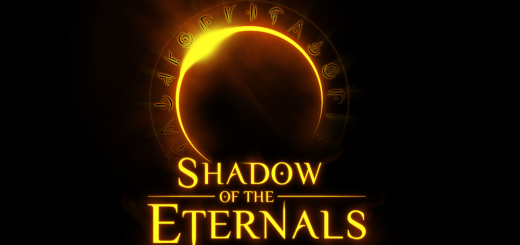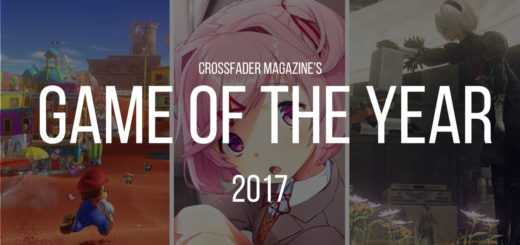GOD OF WAR and the Catch-22 of Cinematic Gaming
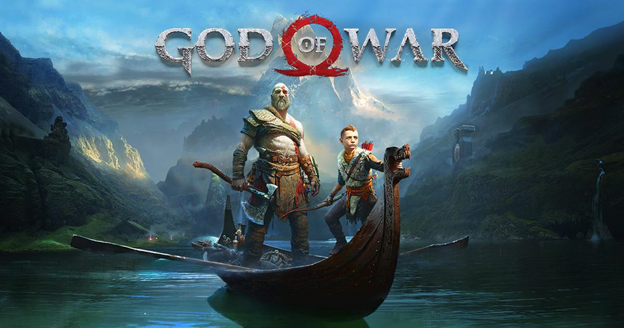
It’s rather fitting that the hardest difficulty in the re-envisioned GOD OF WAR is labelled “Give Me God of War.” Any gamer looking to relive the combo mania of yore is sure to have a bone to pick with SIE Santa Monica Studio’s latest take on the brutal franchise. The frenzied melees of BAYONETTA and DEVIL MAY CRY are nowhere to be found here. It’s ironic too, seeing as the school of Hideki Kamiya isn’t exactly extinct as much as it is niche—a fate that has rendered that brand of hack’n’slash game play definitively old school. All that is to say, yes, there is more Dark Souls in GOD OF WAR than . . . well . . . God of War.
I think it’s safe to say that GOD OF WAR is one of the most affecting emotional journeys on the current console generation. But much like many of its contemporaries, it’s arguably way too big, an absolutely massive game littered across a hub world that shifts and changes over the course of the narrative. It’s a design choice that calls every Sony-exclusive RPG under the sun to mind, but it offers little in the way of cinematic storytelling, adding scenic routes to a story that could benefit from a leaner structure.
Despite the tonal variety offered by Sony—from the sadism of BLOODBORNE to the much more chipper adventuring of HORIZON: ZERO DAWN—it’s hard to say that GOD OF WAR is a genre newcomer. If anything, it finds itself smack in the middle of those aforementioned games, a refreshingly challenging brawler that also successfully fills the player with a lust for adventure. It’s nowhere near as difficult as it could be, and mastering the game’s mechanics no longer requires the countless hours of combo memorization. It seems Sony tasked itself with an unimaginable hurdle: reconfiguring the God of War franchise so as to accommodate both the cinematic stylings of THE LAST OF US without losing the Nordic treasure hunting of SKYRIM. So how did they pull it off?
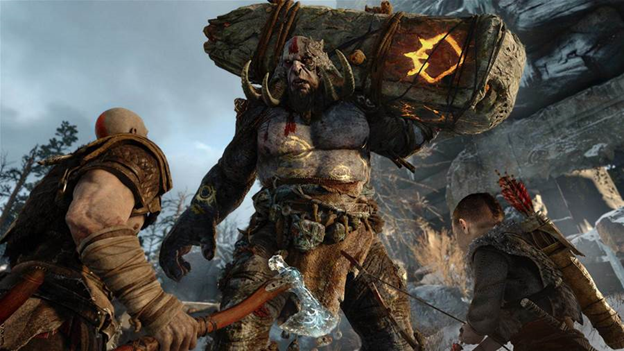
DAD OF BOY (2018)
Sony’s solution came in two variants: the introduction of Atreus and ambitious camerawork. Atreus is a fascinating case study in communicating mechanics to the player. As an ignorant young warrior, his inquisitive voiceover doubles as both the audience’s proxy and the player’s need for a tutorial. After eliminating the entirety of Greek mythology across seven games, Kratos really has no reason to take advice from anyone, which is why Atreus is such a brilliant symbiosis of the newbie player and the game’s eponymous veteran. It’s a holistic solution that allowed director Cory Barlog to create an entirely new God of War game without having Kratos explain anything to himself. Instead, much of the game’s tutorial is told by way of child rearing; Kratos teaching Atreus, ergo the player, how to fight (not unlike the opening to HORIZON: ZERO DAWN). It’s a fascinatingly cinematic solution to an age-old game design problem.
The catch is that Atreus has made GOD OF WAR a noticeably less challenging game. His inclusion in virtually every battle draws enemy attention away from Kratos, provides long-range attack options, and enables the summoning of additional animal allies. This certainly delivers in diversifying gameplay, as well as justifying Atreus’ presence, but battles never feel quite as breakneck as they once did. Fighting a horde of foes has been reduced to a quasi-tag team. It’s still hard (the optional Valkerie battles are a hardcore gamer’s delight) but everything from checkpoints to combos are far more forgiving than in earlier entries—for goodness sake, this game has a revive ability if you need the extra hand-holding.
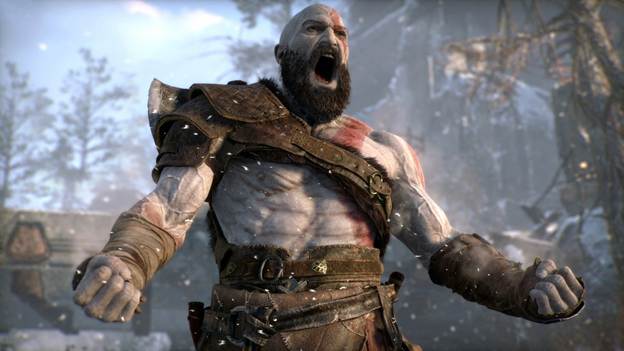
“This . . . is . . . Norway!”
This isn’t a bad thing. Dialing a hardcore fighting game down to a more accessible RPG has certainly opened up GOD OF WAR to a broader fanbase. Nu-Kratos is no longer the vicious brute he used to be—face it, there’s more Marvel Cinematic Universe humor in him than you’d care to admit—and the entire crux of GOD OF WAR’s narrative is fueled by grief, loss, and paternity, rather than blind rage. In short: GOD OF WAR has really toned down the testosterone.
Narratively, this has done wonders for an emotionally stupid franchise. Mechanically, it’s made the game a lot easier—probably because this newfound emphasis on dramatic storytelling has cast hardcore gaming to the wayside. All of this can be traced back to Sony’s attempt to make the game feel more like an actual capital-F Film. It’s a curiosity that I began to notice with the game’s heavily advertised gimmick of the unbroken shot. The novelty of making a game that’s a “oner” isn’t exactly game changing—frankly it was bound to happen seeing as UNCHARTED 4 already bridged an important gap in telling an epic yarn with zero loading screens—but whether GOD OF WAR was the right candidate for this promotional stunt is questionable.
Sure, GOD OF WAR can now call itself video game’s BIRDMAN, but why craft a long take out of a game that’s rather predicated on retries? Why not leave this to the likes of Telltale and Quantic Dream, games that never halt their narrative progression? After all, if you can whizz through GOD OF WAR without a single death and actually see the unbroken take in all its glory, you’ve played it at the wrong difficulty, and if you’ve spent as much time as I have solving optional puzzles and dungeon diving, then you’ve died enough times to nullify the unbroken shot anyway.
Sure, it looks cool when it works (the initial boss fight with The Stranger is a showstopper), but if we’re talking aesthetics, shouldn’t the game feel like this the entire way through? The irony of cinematic gaming is that hard games inherently interrupt the flow of information; storytelling is delayed with every death, side quest, and menu interaction. If hard games can even truly be cinematic is frankly up for debate. If you ask me, the only thing that delays storytelling more than pressing “start at last checkpoint” is solving optional puzzles, something developers have long stated gamers can easily skip—but let’s face it, we can’t not explore that alcove!
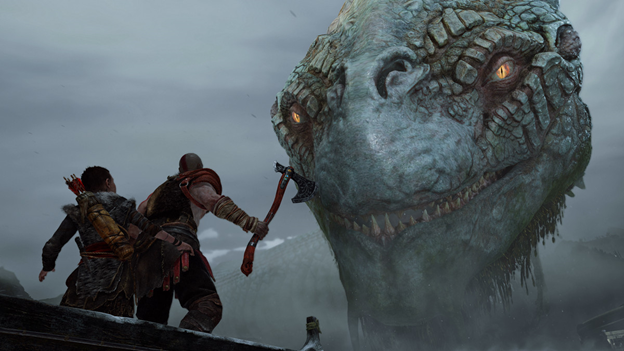
World Serpent: “You want more puzzles sssss?”
Kratos: “Please no.”
World Serpent: “Let me move and lower the water ssssss!”
Atreus: “Dad I have two new arrow types to unlock treasures.”
Kratos: “Shoot me with one.”
So can opulence find its counterbalance with the flow of difficulty? I remember my frustration with the needlessly elaborate quicktime event in the finale of UNCHARTED 3, a sequence that didn’t feel rewarding, but had me replaying the same theatrical brawl out of curiosity for the game’s ending. GOD OF WAR finds itself in a similar conundrum. It’s unfathomably masterful in its design, delivering a cathartic, Oscar worthy single-player experience. But its abundant hub world occasionally undercuts how immensely engaging its linear story is.
I understand how you can read this as me unpacking a lot of personal baggage, levelling my frustrations with open world gaming, but when even UNCHARTED: THE LOST LEGACY has a hub world the likes of GOD OF WAR, I really begin to believe that Sony is just copy pasting their (very successful) template into every new release. Rowing my boat through the Lake of Nine makes for some quality father-son banter, but it’s this wealth of puzzle solving and crate digging that often has me trail off and forget what’s really important here, the story of a father and son trying to spread the ashes of their loved one.

